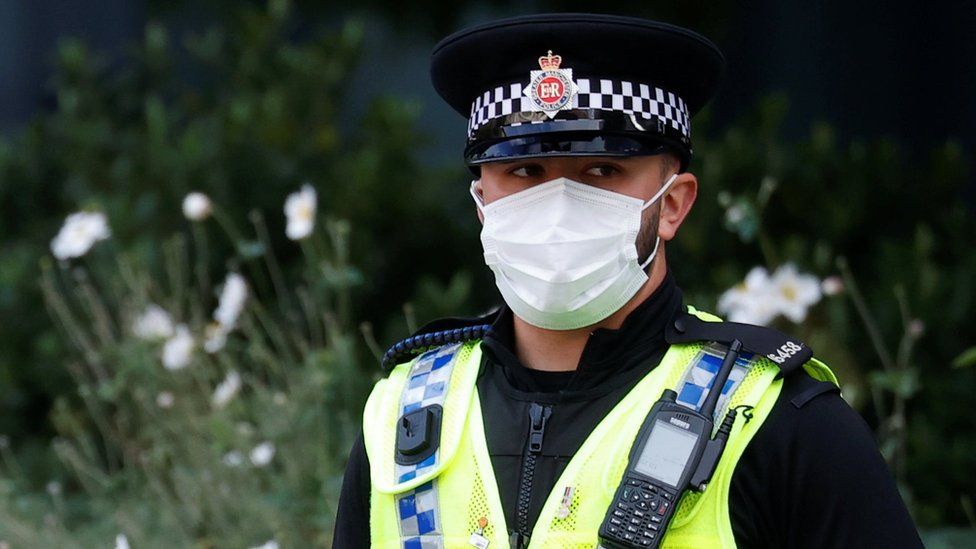Greater Manchester Police 'failed to record 80,000 crimes in a year'
- Published

England's second-largest police force failed to record about 80,000 crimes in a year and closed cases without proper investigation, a watchdog has found.
Inspectors said Greater Manchester Police's (GMP) service to victims of crime was a "serious cause of concern".
HM Inspectorate of Constabulary (HMIC) said about 220 crimes a day went unrecorded in the year up to June 2020.
Victim support charities said it was "shocking" while the Greater Manchester mayor apologised on GMP's behalf.
In the 12-month period reviewed by inspectors, it was estimated the force had recorded 77.7% of reported crimes, a drop of 11.3% from 2018.
HMIC's report said about one in five of all crimes and one in four violent crimes reported to GMP were not recorded.
'Victims let down'
The review also found officers prematurely closed some investigations on the basis the victim did not support police action.
Inspector Zoe Billingham said she was "deeply troubled" by the frequency of closed cases without a full investigation.
"In too many of these cases, the force did not properly record evidence that the victim supported this decision," she said.
This was particularly evident in cases of domestic abuse, where seven in 10 were closed on this basis, Ms Billingham said.
She said it was "simply not good enough" that, despite being urged by the watchdog to improve in 2016, "concerns have not been addressed for over four years".
Ms Billingham did, however, acknowledge the force was taking action and had made a "marked improvement" in its recording of serious sexual offences and rapes.
A further inspection will take place in six months.
Independent Choices in Greater Manchester said: "It's extremely shocking for us, as a domestic abuse charity, to hear that 70% of all domestic abuse cases were closed prematurely by GMP."
Jo Roberts, manager of the charity, said: "Victims of domestic abuse are extremely vulnerable and it takes so much courage to seek help in the first place so it is vital they get the right support and help when they report cases to the police.
"This could discourage victims from reporting incidents in future, potentially putting their lives in danger."
'Coercive control'
Women's Aid said it was alarmed by the findings too.
It was "crucial" police and wider justice system listen and respond to the wishes and needs of survivors of domestic violence, Lucy Hadley, head of policy and campaigns said.
"Survivors and our member services continue to make clear that perpetrators of coercive and controlling behaviour are still not being held accountable - and, as today's report shows, a very high proportion of unrecorded crimes in the Greater Manchester Police region involved coercive control."
"This means that patterns of abuse and harm are not being investigated, and opportunities to support survivors are missed."
Clare's Law
Failing to report domestic abuse has "a knock-on effect for future victims," Jane Gregory from the Salford Survivor Project said.
The abuse will not be recorded on Clare's Law register, she said, "it may put other victims at risk".
The scheme - named after Clare Wood, 36, from Salford who was murdered by her ex-boyfriend with a record of violence against women in 2009 - allows the police to disclose information on request about a partner's previous history of domestic violence.
Sarah Lewis, Greater Manchester Victim Support manager, said: "We want victims to know we are here to support them regardless of whether they have reported an incident to the police.
"More needs to be done to strengthen victims' trust in the process so that they are not suffering in silence and feel supported and listened to when reporting crimes."
Deputy Chief Constable Ian Pilling said the force was "disappointed... particularly where we have let victims down".
He said GMP had a long-term "robust" strategic plan to address the issues raised and "secure the best possible outcomes for victims".
The inspection had coincided with the implementation of a troubled computer system and "unprecedented challenges posed by the first Covid lockdown", he added.
Greater Manchester Mayor Andy Burnham apologised on behalf of GMP.
He said: "I would like to say sorry to all of the victims of crime who have found that the service has not been good enough.
"We owe it to them to improve and we will and we will do it fast."
The region's deputy mayor for policing Bev Hughes said the findings were "extremely disappointing".
She added that she had "communicated my feelings" to the force's Chief Constable Ian Hopkins, "who must now move quickly to make improvements".
Have you been affected by the issues raised in this story? Share your experiences by emailing haveyoursay@bbc.co.uk.
Please include a contact number if you are willing to speak to a BBC journalist. You can also get in touch in the following ways:
- WhatsApp: +44 7756 165803
- Tweet: @BBC_HaveYourSay
- Please read our terms & conditions and privacy policy
If you are reading this page and can't see the form you will need to visit the mobile version of the BBC website to submit your question or comment or you can email us at HaveYourSay@bbc.co.uk. Please include your name, age and location with any submission.
Related Topics
- Published3 March 2020
- Published3 March 2020
- Published5 February 2020
- Published17 July 2019
- Published8 March 2014